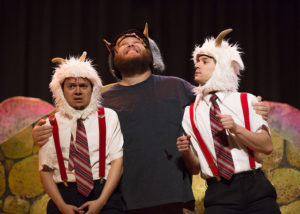
Opera Tales – How John Davies Introduces Children to the Art Form
By Greg Waxberg(Production photo: Duane Tinkey/Des Moines Metro Opera’s “Billy Goats Gruff”)
Father of six, retired bass-baritone John Davies first attempted to write a children’s opera for an unusual reason.
“Around 1978,” he remembered in an interview with OperaWire, “it seemed to me that the tobacco industry was advertising to my young children, with the Marlboro Man, Joe Camel, and Virginia Slims Lady trying to make boys and girls think that smoking was manly and feminine. There were flight-themed cigarette commercials after the first ‘Star Wars’ came out. Cigarettes were sold in the same supermarket checkout lines as candy. My response to all of this was, ‘Why target children’?”
His other response was to try to do something about it.
Doing Something About It
At the time, Davies was Artist-in-Residence for Opera Theater of Syracuse and director of its outreach program, bringing programs into schools. So, with the assistance of composer Ross Dabrusin, whom he had met through a summer job as a singing waiter while he was in college, Davies wrote an experimental 45-minute anti-tobacco musical comedy theater piece, “The Night Harry Stopped Smoking.”
The premise? Harry finishes his last cigarette of the day, falls asleep in his chair, and dreams that he meets characters who represent the insides of his lungs and heart.
“His body wants to send him the message that he won’t be as healthy if he smokes,” Davies said. “I’m not a crusader, so I didn’t use the piece to directly tell children ‘don’t smoke,’ but the whole media situation bothered me enough that I wanted to make them aware of the dangers.”
Having finished what would become his first children’s opera, Davies wanted to ensure its medical accuracy. He vetted it with the medical community, including the opera company’s Board President, a laryngologist at the time, and the Syracuse chapter of the American Lung Association.
Via his connection with Jane Ferry, a super at Opera Theater of St. Louis, Davies also ended up having the score shared with her husband Dr. Richard Ferry (a neurologist), other doctors, and with opera director (and former physician) Sir Jonathan Miller, who called it “very engaging . . . amusing and tuneful.”
With “Harry” a success in 1983 (the November 1987 issue of “Opera News” listed it as one of the 10 most-performed contemporary operas during the 1986-87 season), Davies said he “fell into the notion of writing operas for children, which young professional singers might perform under the auspice of an opera company or a university opera program.”
Hence, Opera Tales was formed.
More Opera Tales
Next up was “Three Little Pigs” for Opera Theater of Syracuse in the early 1990s. He would go on to write additional pieces, incorporating music of Mozart, Offenbach, Rossini, Donizetti, and Sullivan: “Little Red’s Most Unusual Day,” “Billy Goats Gruff,” “Jack & the Beanstalk,” “Pinocchio,” “The Bremen Town Musicians,” and “Goldie B. Locks & the Three Singing Bears”—all written for soprano, mezzo, tenor, and bass, with piano accompaniment.
“So far, these children’s operas accommodate four singers, who are sometimes double cast,” Davies said. “However, based on suggestions from university opera programs, I’m considering writing future children’s operas for more than four singers.”
Opera Tales are based on fairy tales because “children are already familiar with the stories,” though Davies hastened to add, “My operas are treatments of these stories and don’t always adhere to traditional narratives. This engages a young audience to figure out where the stories differ, becoming almost like a game.”
As Davies pointed out, another benefit of fairy tales is a simple plot structure, quite helpful for an opera performed during a 35- to 40-minute school period.
Among the feedback he has received is contained in a letter from Dr. Debrah A. Shulman of Moses DeWitt Elementary School in DeWitt, NY, dated January 8, 1986:
“It is with great pleasure that I write to share an experience I had this morning while teaching a smoking unit. One fourth grader quickly and correctly answered the question, ‘What are alveoli?’ When I asked how he knew, he enthusiastically replied, ‘I learned it from the smoking opera we saw in first grade!’ The class remembered the costumes, the characters, and most importantly, the message! Thank you once again not only for entertaining but also for educating our students.”
Asked what he cares about most, Davies replied, “For young people seeing an opera for the first time to have so much fun, they’ll want to see another. I want them to have a good time with the art form.”


